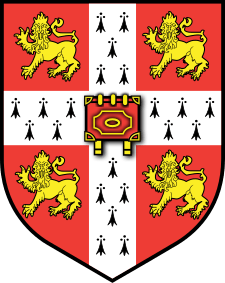John Worthington (academic)
John Worthington (1618–1671) was an English academic. He was closely associated with the Cambridge Platonists.[1][2][3] He did not in fact publish in the field of philosophy, and is now known mainly as a well-connected diarist.
Life
He was born in Manchester, and educated at Emmanuel College, Cambridge.[4] At Emmanuel he was taught by Joseph Mead; he described Mead's teaching methods, and later edited his works.[5] Another teacher was Benjamin Whichcote.[6]
He was Master of Jesus College, Cambridge, from 1650 to 1660, and Vice-Chancellor in 1657.[7] At the English Restoration he was replaced by Richard Sterne, apparently willingly.[8] Subsequently he held various church positions, being lecturer at St Benet Fink in London until burnt out in the Great Fire of London in 1666. He then was given a living at Ingoldsby. At the end of his life he was a lecturer in Hackney.[9]
He died in London.
Family
He married Mary Whichcote, in 1657. She was niece to both Benjamin Whichcote[10][11][12] and Elizabeth Foxcroft (née Whichcote), wife of Ezechiel Foxcroft.[13]:197
Hartlib correspondence
Worthington was an active correspondent of Samuel Hartlib, the "intelligencer", in the period 1655 to 1662.[6] At Worthington's request, Hartlib's close collaborator John Dury searched in the Netherlands for the lost papers of Henry Ainsworth.[14] He shared with Hartlib and Dury (and both Henry More and John Covel) an interest in the Karaites.[15] He was also involved in the connections between Hartlib and Dury with Adam Boreel in Amsterdam, including the Boreel project to translate the Hebrew Mishnah into Latin and Spanish.[16]
After Hartlib's death, Worthington took on the task of organising his archive of correspondence, which had been bought by William Brereton, 2nd Baron Brereton.[17] After a period of nearly 300 years, the bundles into which he sorted it were rediscovered, and his system for the archive persists.[18]
Works
- The Christian's Pattern: a translation of the De Imitatione of Thomas à Kempis (1654)
- John Smith, Selected Discourses (London, 1660) editor
- Life of Joseph Mede with third edition of Mede's Works (1672)
- The Great Duty of Self-Resignation to the Divine Will (1675)
- The Diary and Correspondence of Dr. John Worthington, 2 vols. (1847–86, Chetham Society), editor James Crossley
Notes
- Hutton, Sarah (1 August 2013). Zalta, Edward N. (ed.). The Stanford Encyclopedia of Philosophy. Metaphysics Research Lab, Stanford University – via Stanford Encyclopedia of Philosophy.
- http://www.oxforddnb.com/public/themes/94/94274-content.html
- "Free Site Search Engine - put a search engine on your web site or add search to your blog". www.jrank.org.
- "Worthington, John (WRTN632J)". A Cambridge Alumni Database. University of Cambridge.
- "The University of Cambridge: The early Stuarts and Civil War | British History Online". www.british-history.ac.uk.
- Andrew Pyle (editor), Dictionary of Twentieth-Century British Philosophers (2000), pp. 914-5.
- "Archived copy". Archived from the original on 21 February 2008. Retrieved 8 June 2016.CS1 maint: archived copy as title (link)
- "The University of Cambridge: The age of Newton and Bentley (1660-1800) | British History Online". www.british-history.ac.uk.
- "Hackney | British History Online". www.british-history.ac.uk.
- Betty Jo Teeter Dobbs.The Foundations of Newton's Alchemy: Or "The Hunting of the Greene Lyon" (1983), p. 112.
- Robert Crocker, Henry More, 1614-1687: A Biography of the Cambridge Platonist (2003), note p. 260.
- http://www.jesus.cam.ac.uk/college/history/masters.html#worthington Archived 2009-07-05 at the Wayback Machine
- Crocker, R. (2003). Henry More, 1614-1687: A Biography of the Cambridge Platonist. Springer Science & Business Media. ISBN 9781402015021. Retrieved 20 January 2018.
- "Biblical Criticism Catalogue Number 70". www.mhs.ox.ac.uk.
- Matt Goldish, Judaism in the Theology of Sir Isaac Newton: International Archives of the History of Ideas (1998), p. 23.
- see Popkin, Richard H., “Hartlib, Dury and the Jews,” in M. Greengrass, M. Leslie, and T. Raylor, eds., Samuel Hartlib and Universal Reformation: Studies in Intellectual Communication, Cambridge, Cambridge University Press, 1994, pp. 118-136; cf. pp. 122-123.
- Michael Hunter, Archives of the Scientific Revolution: The Formation and Exchange of Ideas in Seventeenth-century Europe (1998), p. 40.
- Sheffield, University of. "Hartlib Papers - Special Collections - The University Library - The University of Sheffield". www.sheffield.ac.uk.
References
- Attribution

External links
| Academic offices | ||
|---|---|---|
| Preceded by Thomas Young |
Master of Jesus College, Cambridge 1650–1660 |
Succeeded by Richard Sterne |
